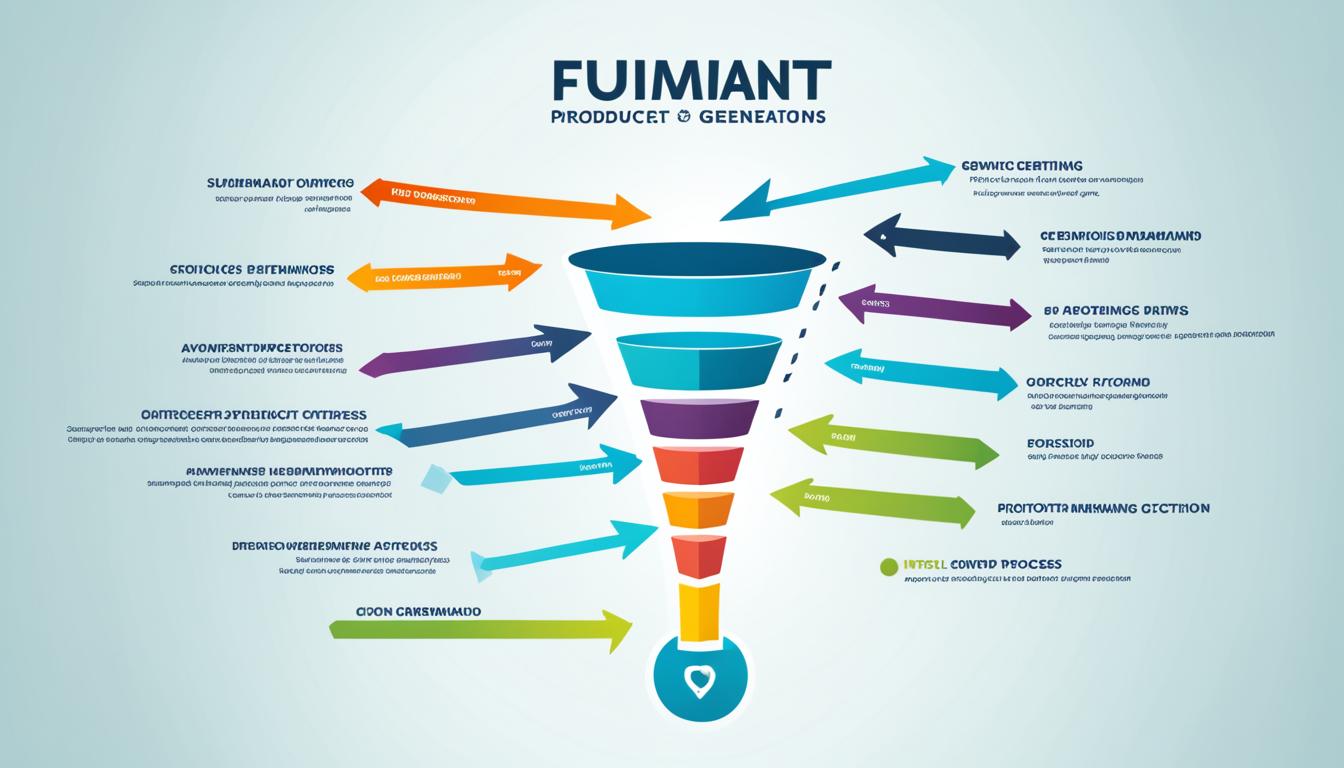Field marketing plays a big role in marketing plans. It includes events, brand promotion, and getting people interested. This marketing style, also called experiential or guerilla marketing, uses one-on-one talks with folks to make memorable moments and strong bonds.
Field marketing uses tools like sales promotions, merchandising, audits, samples, demos, and roadshows. These efforts let brands show off their products and services up close. This helps create real connections and friendships with their audience.
Key Takeaways:
- Field marketing is an in-person marketing strategy that focuses on event promotion, brand activation, and consumer engagement.
- It involves face-to-face interactions with potential customers to create lasting impressions.
- Field marketing encompasses activities such as direct sales promotions, merchandising, sampling, demonstrations, and roadshows.
- These initiatives contribute to building brand awareness, establishing strong relationships, and driving customer loyalty.
- Field marketing allows for personalized interactions that can leave a lasting impact on consumers, fostering brand loyalty and advocacy.
Benefits of Field Marketing
Field marketing helps companies in many ways. It improves brand perception. Direct interaction with the audience gives them a real feel of the brand. In-person contact makes a lasting and real connection with customers.
Field marketing works well with cynical customers. It addresses their concerns instantly during demos. This personal touch builds trust and gets skeptical customers to think about buying.
Field marketing boosts the sales effort. It offers personalized help to potential buyers. Field reps are like guides who answer questions and support customers’ decision-making.
When it comes to customer relationships, field marketing offers a unique and personal experience. Direct interactions help field reps learn what customers like and need. This information is key to making future campaigns better and keeping customers loyal.
Also, field marketing gives measurable ROI. Through real-time reports and analytics, companies can see how well their field marketing works. They can use this data to make better plans for future campaigns.
Field marketing is great at accurate targeting. It focuses on certain places and groups of people. This increases chances of success by making sure efforts connect with the right audience.
Field marketing’s role in better brand image, dealing with doubtful customers, supporting sales, improving customer relationships, showing clear ROI, and correct targeting is huge. It’s a strong strategy for companies wanting growth and real connections with their audience.
Field Marketing Activities
Field marketing includes different ways to engage customers and promote a brand. It uses a team of skilled salespeople. These efforts help interact with potential customers and create lasting impressions.
Sales Staff Engagement
Skilled sales teams are key in field marketing. They run sales promotions and sell products directly where many prospects are. They make personal connections, share the brand’s value, and answer any questions.
Merchandising
Merchandising is key to field marketing, focusing on strategic placement of marketing materials. Teams work with retail partners to ensure products are visible and promoted in stores. Good product placement and displays boost brand awareness and sales.
Auditing
Auditing is crucial for understanding a brand’s market position. Field marketing teams check how products are displayed in stores, enforcing brand guidelines. This helps track and improve the brand’s visibility and market share.
Sampling and Demonstrating
Sampling and demonstrating let customers try products themselves. Companies use them to show how products work in real life. These tactics increase customer trust, potentially boosting sales and loyalty.
Experiential Marketing, Events, and Roadshows
Experiential marketing and events connect customers with a brand on an emotional level. They offer unique interactions, like immersive experiences or demos. These create strong connections that go beyond traditional marketing.
| Field Marketing Activities | Key Objectives |
|---|---|
| Sales Staff Engagement | Drive direct sales, build relationships, convey brand value |
| Merchandising | Enhance brand visibility, optimize product placement |
| Auditing | Monitor brand presence, ensure compliance with brand guidelines |
| Sampling and Demonstrating | Enable customers to experience products, influence purchase decisions |
| Experiential Marketing, Events, and Roadshows | Create emotional connections, foster brand loyalty |
Field Marketing vs. Digital Marketing
Field marketing and digital marketing are two different strategies. Field marketing involves meeting customers face-to-face at sales points, events, and conferences. It lets marketers talk directly with customers and give out things like freebies to make special connections.
Digital marketing, however, uses digital platforms like social media and websites to reach more people. These platforms help reach a broad audience online, making things convenient and accessible. It involves skills like search engine optimization (SEO) and content marketing to improve online presence and interaction.
Field marketing is great for making personal connections with customers, but it doesn’t reach as many people. Digital marketing can target specific groups and has a big impact through social sharing.
Field marketing campaigns might be slow to show results because they depend on personal interactions. On the flip side, digital marketing gives instant feedback on how campaigns are doing. Marketers can quickly change their strategies based on this feedback.
Using both field and digital marketing can be very effective. Field marketing works well for making people aware of a brand, creating customer relationships, and increasing sales directly. Digital marketing is great for reaching a lot of people, targeting specific campaigns, and tracking online actions.
Field marketing can be costly because of training staff, organizing events, and making physical materials. Digital marketing involves spending on online ads, making websites, and improving them regularly.
Choosing between field and digital marketing depends on the campaign’s goals, audience, and budget. By understanding each method’s pros and cons, marketers can use both to reach more people, engage them, and get better results.
Field Marketing Organization
To start successful field marketing campaigns, companies set up field marketing organizations. These groups are key in planning and running marketing efforts. They ensure each aspect of the campaign works together flawlessly.
Field Marketing Representatives
Field marketing representatives are the main people showing the brand off. They demonstrate products, make sales, engage with potential buyers, and boost brand visibility in person.
Field Marketing Managers
Field marketing managers lead the teams that execute campaigns. They make sure campaign goals are met, manage the team’s activities, and track the success and reach of the campaigns.
Brand Ambassadors
Brand ambassadors are crucial to the field marketing team. They embody the brand and represent it during interactions with the audience. Through engaging and promoting the brand, they build positive connections.
Street Team Representatives
Street team representatives focus on taking the brand to busy areas. They engage people, hand out promotional items, and highlight why the brand matters. This boosts awareness and interest among the audience.
Types of Field Marketing Campaigns
Field marketing campaigns come in many forms to catch customers’ attention. They use different strategies to spread the word about the brand, increase sales, and give people something to remember. Here are the main types:
1. Product Demonstrations
Product demonstrations are a common way to show what a product can do. Marketers give away samples or demonstrate the product live. This helps customers see the product’s worth, making them more likely to buy it.
2. Direct Selling
In direct selling, marketers sell products right to customers where they meet. This personal touch helps build trust and offers tailored advice. It’s a great way to form bonds with customers and boost sales.
3. Retail Audits
Retail audits let marketers see how their brand looks in stores. They check things like where products are placed, their prices, and how visible the brand is. This feedback is gold for improving how products are presented and sold in stores.
4. Guerrilla Marketing
Guerrilla marketing is about being bold and out of the box. It surprises people in fun ways, making the brand stick in their minds. It could be anything from flash mobs to striking street art, making brands memorable.
Here’s a table that shows what each campaign type does:
| Type of Field Marketing Campaign | Key Attributes | Example |
|---|---|---|
| Product Demonstrations | Engaging interactions, showcasing product features and benefits | Demonstrating a new kitchen gadget at a popular home goods store |
| Direct Selling | Face-to-face sales, building relationships, personalized recommendations | Selling skincare products at a local beauty expo |
| Retail Audits | Assessing brand visibility, analyzing in-store marketing efforts | Examining product placement and signage in multiple grocery stores |
| Guerrilla Marketing | Creative and unconventional campaigns, generating buzz | Hosting a surprise pop-up concert in a busy city center |
By mixing these campaign types, brands can customize their approach. They can directly engage with customers, earn their loyalty, and support both immediate and future growth.
Field Marketing vs. Traditional Marketing
Field marketing complements traditional marketing well. It makes traditional campaigns more effective. This leads to better brand recognition, more sales, and quicker reactions in the market.
Field marketing’s main strength is offering personalized experiences. Unlike TV or print ads, it lets brands engage directly with people. This creates stronger bonds and deeper brand knowledge.
Field marketing also excels in gathering and analyzing data quickly. Teams interact face-to-face with customers, getting instant feedback. This quick data handling helps brands adapt swiftly to trends and preferences.
Field marketing uses the awareness that traditional marketing creates to boost sales. Traditional campaigns get the brand out there and spark interest. Field marketing then turns this interest into actual sales with direct engagement.
In short, field marketing and traditional marketing together lead to strong campaigns. While traditional methods increase visibility, field marketing adds a personal touch, quick data insights, and sales boosts. Together, they build a powerful marketing strategy that improves brand presence and business growth.
Best Field Marketing Event Ideas
Field marketing gives you great event ideas for B2B marketing. These events include customer meetings, roadshows, product launches, and pop-up shops. They let companies meet their audience face-to-face.
Face-to-Face Customer Meetings
Meeting customers face-to-face is a great method. It helps guide them on their buying journey. You learn their needs and build a strong connection.
This bond boosts their trust in your brand and products. It makes your help more personal.
Roadshows
Roadshows take your brand right to your audience. These events move to different locations with interactive setups. They’re about showing off your brand, getting leads, and tightening customer bonds.
Product Launches
Product launches make a big splash about new products. They’re planned to grab attention and excite people. This excitement can boost sales and make your product a hit.
Pop-up Shops
Pop-up shops are short-term retail events in busy areas. They make shopping feel exclusive and urgent. You can use them to show off products and attract buyers.
Using these field marketing ideas can boost your B2B strategy. They help you connect better with your audience, get more leads, and make your brand more visible. These events offer a unique way to meet and remember potential customers, which helps your business grow.
| Event Idea | Description |
|---|---|
| Face-to-Face Customer Meetings | Personalized meetings with customers to guide them through their buyer’s journey and understand their challenges. |
| Roadshows | Traveling events that bring the brand directly to the target audience, involving interactive displays and demonstrations. |
| Product Launches | Exciting events that generate buzz and anticipation around new product offerings. |
| Pop-up Shops | Temporary retail experiences in high footfall areas to promote brand visibility and encourage customer engagement. |
Field Marketing Definition
Field marketing is all about reaching consumers directly to increase brand awareness, boost sales, and connect with local buyers. It uses strategies like promotions, demos, and direct sales to put products right in front of people. By doing this, field marketing builds strong links between brands and consumers. This leads to a better image of the brand, more sales, and deeper connections within local markets.
Key Objectives of Field Marketing
Field marketing aims to achieve important goals:
- Brand Awareness: It uses face-to-face interactions and targeted promos to make more people know about brands.
- Increased Sales: By showing off products and offering personal experiences, it helps sell more in certain places.
- Engagement: It builds connections with local markets, linking consumers closely with brands.
The Role of Field Marketing in the Marketing Mix
Field marketing is a crucial part of the marketing blend. It adds to other strategies with its unique approach. Unlike digital and traditional ads that target wide audiences, field marketing brings direct, personal contact with consumers.
This direct interaction, mixed with other marketing strategies, helps businesses grow. They can make more people aware of their brand, sell more, and build lasting relationships with customers.
Benefits of Field Marketing
Field marketing comes with unique advantages:
- Personalized Interactions: It offers targeted and personal contact with people, making brand experiences unforgettable.
- Localized Focus: By aiming at specific areas and communities, it meets the unique tastes and needs of local shoppers.
- Enhanced Brand Perception: Its direct approach makes brands more relatable, improving how people see them and building positive thoughts.
- Increased Sales: Activities like demos and direct sales push sales up by letting people try products themselves.
| Benefit | Description |
|---|---|
| Personalized Interactions | Field marketing enables targeted and personalized engagement, resulting in a more memorable brand experience for consumers. |
| Localized Focus | By targeting specific locations and communities, field marketing campaigns can cater to the unique preferences and needs of local consumers. |
| Enhanced Brand Perception | The direct nature of field marketing initiatives humanizes brands, improving brand perception and fostering positive associations. |
| Increased Sales | Demonstrations and direct sales in field marketing drive sales by allowing consumers to experience products firsthand. |
What Is a Field Marketing Organization?
A Field Marketing Organization (FMO) is a team in a company. It handles the development and execution of field marketing campaigns. These groups are essential in managing field teams, territories, and resources to meet campaign goals.
Field marketing organizations work on planning and doing marketing activities outside of usual ad channels. Their main aim is to make impactful and personal brand experiences. This is done through face-to-face talks with consumers.
The creation of effective field teams is a key part of a Field Marketing Organization. These teams have people with special skills who carry out the everyday tasks of the field marketing campaigns. The FMO takes charge of hiring, training, and managing these team members.
Within a Field Marketing Organization, there are various job titles and roles. Each contributes to the campaigns’ success:
- Field Marketing Representatives: They are the main advocates of the brand. They engage with consumers, show product demos, and boost brand awareness.
- Field Marketing Managers: These professionals manage the field teams. They organize campaign logistics and ensure campaign goals are achieved.
- Brand Ambassadors: They are the brand’s face, interacting with consumers. They promote the brand through meaningful engagements.
- Street Team Representatives: They do street-level marketing tasks. For example, distributing promotional materials and creating buzz around the brand.
By using the expertise of a Field Marketing Organization and its field teams, companies can reach their target audience well. They boost brand visibility and drive meaningful consumer interactions. The smooth coordination and running of field marketing campaigns help companies meet their marketing goals and get the most from their investment.
Field Marketing vs. Demand Generation
Demand generation is key for marketing, focusing on raising awareness and sparking interest. It uses lots of tactics and channels to effectively reach the audience. Among these, field marketing is vital in generating leads and pushing sales with special promotions.
Field marketing strategies directly connect with prospects and customers. Through in-person interactions and custom experiences, they grab potential customers’ attention. The aim is to forge strong connections, earn trust, and boost sales.
Generating leads is a main goal of demand generation, and field marketing is perfect for this. Events, demos, and direct talks help find interested leads for the sales teams. This lets them focus on prospects likely to buy.
Field marketing also helps with sales by running in-person promo campaigns. These campaigns make people act now by offering special deals or limited-time offers. Field marketing uses its direct contact to drive sales through a personal touch.
| Field Marketing | Demand Generation |
|---|---|
| Directly engages with prospects and customers | Creates awareness and interest |
| Generates leads through targeted campaigns | Focuses on lead generation |
| Executes sales-focused promotions | Drives demand for products or services |
Demand generation uses many marketing tactics, and field marketing stands out by offering in-person and personalized experiences. It supports wider strategies by engaging directly with prospects, finding leads, and running promotions that improve sales results.
Conclusion
Field marketing is a lively way to market that includes meeting people, direct sales, and special promotions. It boosts how people see a brand and connects with customers personally. Also, it brings clear results you can measure. When used with other marketing methods, field marketing makes promotion campaigns that really reach people and get them excited about the brand.
By using field marketing, brands can make a better impression on their target audience. They get to talk directly to people, answer their questions, and earn their trust. This approach personalizes sales and helps build lasting relationships with customers. Doing this strengthens the brand’s overall marketing efforts.
Field marketing also offers the benefit of getting real results through reports and data analysis. This means companies can clearly see how well their campaigns are doing. Adding field marketing to their strategy helps brands make effective promos. It boosts customer involvement and activates the brand. This is key for achieving long-term success in business.






